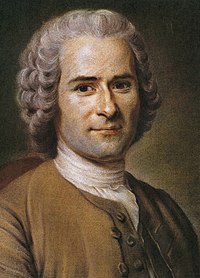Jean-Jacques Rousseau
Jean-Jacques Rousseau[1] [2](28 June 1712 – 2 July 1778) omo ilu Geneffa pataki amoye, olukowe, ati olusopo orin ti Iseromu orundun 18k. Imoye oloselu re ko pa gidigidi lori Ijidide Fransi, ati Ijidide Amerika ati lori gbogbo idagbasoke ero oloselu, oro-alawujo ati eko odeoni.
| Jean-Jacques Rousseau | |
|---|---|
 Rousseau in 1753, by Maurice Quentin de La Tour | |
| Ìbí | 28 Oṣù Kẹfà 1712 Geneva, Republic of Geneva |
| Aláìsí | 2 July 1778 (ọmọ ọdún 66) Ermenonville, Kingdom of France |
| Ìgbà | 18th century philosophy (Modern philosophy) |
| Agbègbè | Western Philosophers |
| Ẹ̀ka-ẹ̀kọ́ | Social contract theory Romanticism |
| Ìjẹlógún gangan | Political philosophy, music, education, literature, autobiography |
| Àròwá pàtàkì | General will, amour-propre, moral simplicity of humanity, child-centered learning, civil religion, popular sovereignty, positive liberty |
Ìpa lórí
Kant, The French Revolution, Robespierre, Louis de Saint-Just, The Counter-Enlightenment, Fichte, Hegel, Goethe, Friedrich Nietzsche, Romanticism, Paine, Comte, Bolívar, Marx, Engels, Derrida, Paul de Man, Benedetto Croce, Galvano Della Volpe, Claude Lévi-Strauss, Leo Strauss, Émile Durkheim, Mikhail Bakunin, Maria Montessori, Leo Tolstoy, John Rawls, Juan José Castelli, Mustafa Kemal Atatürk
| |
Itokasi
àtúnṣe- ↑ "Jean-Jacques Rousseau > By Individual Philosopher > Philosophy". The Basics of Philosophy. Retrieved 2018-07-16.
- ↑ "Jean-Jacques Rousseau - Biography, Philosophy, Books, & Facts". Encyclopedia Britannica. 2018-06-28. Retrieved 2018-07-16.